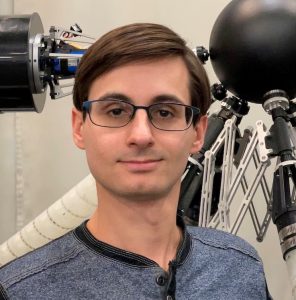LCSR Seminar: Alexander Spinos, “Variable Topology Truss: A Novel Approach to Modular Self-Reconfigurable Robots”
3400 N Charles St
“Variable Topology Truss: A Novel Approach to Modular Self-Reconfigurable Robots”
Abstract:
Conventional robotic systems are most effective in structured environments with well-defined tasks. The next frontier of robotics is to create systems that can operate in challenging environments while autonomously adapting to changing and uncertain task requirements. In the field of modular self-reconfigurable robotics, we approach this challenge by designing a set of robotic building blocks that can be combined to form a variety of robot morphologies. By autonomously rearranging these modules, the system can change its shape to complete a wider variety of tasks than is possible with a fixed morphology.
 In this talk, I will present my research on a new modular robot, the Variable Topology Truss (VTT). Most existing modular self-reconfigurable robots use cube-shaped modules that connect together on a lattice or as a serial string of joints. These architectures are convenient when it comes to designing reconfiguration algorithms, but they face serious practical challenges when it comes to scaling the system up to solve larger tasks. Instead, VTT uses a truss-based architecture. Individual modules are beams which can extend or retract using a novel high-extension-ratio linear actuator: the Spiral Zipper. By connecting the beam modules together like a truss, we can create large, lightweight structures with much greater structural efficiency than conventional modular architectures. Furthermore, the length-changing ability of the Spiral Zipper allows the system to more flexibly adapt its scale and geometry without needing to use as many modules. However, the truss architecture poses new challenges when it comes to motion and reconfiguration planning. I will discuss the hardware design of the VTT system as well as my research on collision-free motion and reconfiguration planning for this novel system.
In this talk, I will present my research on a new modular robot, the Variable Topology Truss (VTT). Most existing modular self-reconfigurable robots use cube-shaped modules that connect together on a lattice or as a serial string of joints. These architectures are convenient when it comes to designing reconfiguration algorithms, but they face serious practical challenges when it comes to scaling the system up to solve larger tasks. Instead, VTT uses a truss-based architecture. Individual modules are beams which can extend or retract using a novel high-extension-ratio linear actuator: the Spiral Zipper. By connecting the beam modules together like a truss, we can create large, lightweight structures with much greater structural efficiency than conventional modular architectures. Furthermore, the length-changing ability of the Spiral Zipper allows the system to more flexibly adapt its scale and geometry without needing to use as many modules. However, the truss architecture poses new challenges when it comes to motion and reconfiguration planning. I will discuss the hardware design of the VTT system as well as my research on collision-free motion and reconfiguration planning for this novel system.
Bio:
Alexander Spinos received his Bachelor’s degree in Mechanical Engineering from Johns Hopkins University. He then joined the Modlab in GRASP at the University of Pennsylvania, where he received his PhD in Mechanical Engineering and Applied Mechanics. His dissertation centered around the mechanical design and self-reconfiguration planning of the Variable Topology Truss, a modular self-reconfigurable parallel robot. He is now a robotics researcher at the JHU Applied Physics Lab, where he works on multi-robot planning and the design of novel robot hardware.


